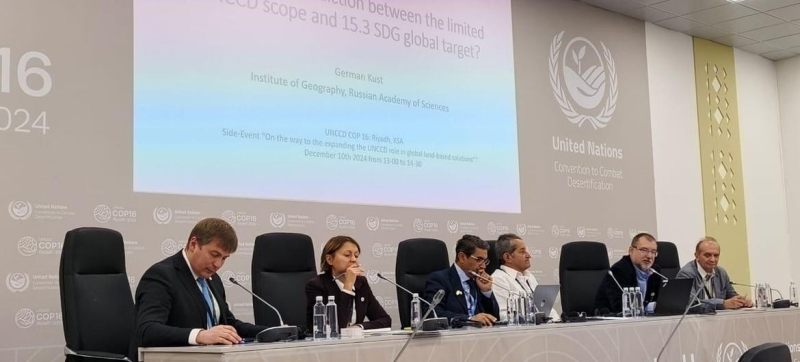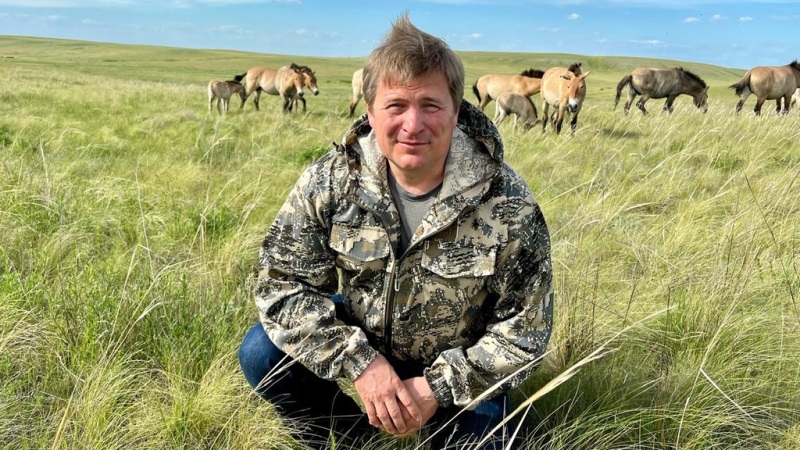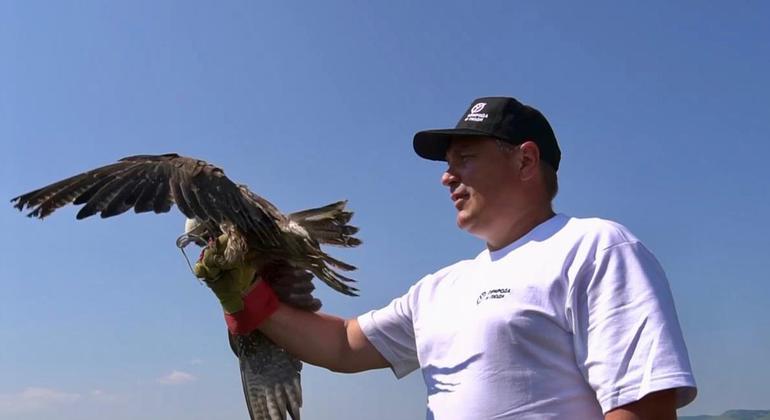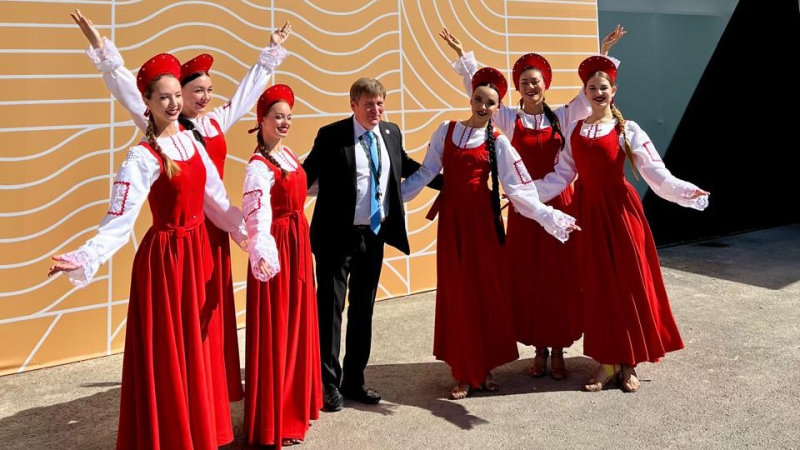
Roundtable organized by the Nature and People Foundation at COP-16 in Saudi Arabia. INTERVIEW | Nature and People Foundation: the climate agenda unites all countries of the world Climate and environment
The 16th session of the Conference of the Parties to the UN Convention to Combat Desertification is continuing in the capital of Saudi Arabia, marking the 30th anniversary of this key agreement on land protection. The Nature and People Foundation is the first in the history of the Convention and so far the only Russian NGO to receive observer status at the conference of the parties. The head of the Foundation, Sergei Rybakov, spoke to Nargis Shekinskaya from the UN News Service about the initiatives that the organization put forward at COP-16 and the significant projects of the Foundation.
UN Convention on Desertification
The UN Convention to Combat Desertification, adopted in 1994, is one of three key international agreements in the field of environmental protection, along with the Climate Convention and the Convention on Biodiversity. However, despite its importance, the Convention on Desertification often remains in the shadow of its “older sisters”, Rybakov believes. The Nature and People Foundation put forward an initiative at a conference in Saudi Arabia to expand the mandate of this agreement, emphasizing its key role in ensuring a sustainable future.
The head of the Fund noted that land degradation affects not only arid regions, but also territories with a temperate climate, including Russia.

Sergey Rybakov, head of the Russian Foundation “Nature and People”
Expanding International Cooperation
On December 10, at the COP-16 site in Riyadh, the Nature and People Foundation held a roundtable discussion on expanding the mandate of the international agreement to combat desertification. “The key topic we came with was expanding the mandate of the UN Convention on Desertification. From our point of view, this is an important part of what needs to be achieved here, during the negotiation process,” said Sergei Rybakov.
Representatives of the Convention Secretariat, the International Union for Conservation of Nature, Saudi Arabia, Russia, as well as Latin American countries and FAO, the Food and Agriculture Organization, took part in the discussion. The participants discussed the need to strengthen coordination between all three conventions, recognizing that climate change, desertification, and biodiversity loss are interrelated processes.
The Nature and People Foundation, as reported by the UN News Service source, presented several specific proposals, including the introduction of a certification and licensing system to combat land degradation based on the successful experience of interaction between business and civil society.
The Foundation has become an important representative of Russia on the global environmental agenda. Rybakov emphasized the uniqueness of the situation: “Our Foundation is the first and only Russian environmental NGO in history that has become an observer to this Convention. We are proud of this status, which we received in September 2024, and which allowed us to organize the event as part of the main program of the 16th session.”
Ecosystems of Russia: Challenges and Solutions
Touching upon the issue of ecology in Russia, Sergei Rybakov noted that the problem of desertification and land degradation is important not only for traditionally arid regions. In Russia, it manifests itself in steppe zones, forests, and even in the Arctic. According to him, changes in natural landscapes, the shift of coniferous forest boundaries to the north and the loss of biodiversity are changing the ecosystem, affecting the country’s economy and the quality of life of the population.

The Foundation works to protect ecosystems in Russia, including unique projects to restore wild animal populations. For example, the Przewalski horse population is being successfully restored in the Orenburg Region. A similar project has been launched in Khakassia. These initiatives are aimed at returning wild animals to nature, which helps solve the problem of desertification and restore biodiversity.
“We have 38 employees in our organization, who are key experts in many environmental areas. The main areas of the Foundation’s work are the conservation of flora and fauna,” Rybakov said. “Responsible consumption, climate, technological innovations, which we can bring to the field of environmental protection. We are called the “real deeds fund” because all the projects we conduct are directly related to projects on earth.”
Unique projects of the fund
Although the Nature and People Foundation is not yet a year old, it has already implemented several large-scale projects. Among them is the release of saker falcons into the wild. “In Khakassia, 50 birds were released, which was the largest event of this kind in Russia,” Rybakov emphasized.
The Foundation has also developed recommendations for interaction with polar bears – “bear patrols,” which is especially important for the Arctic region, where human activity is increasing, the UN News Service source said.
In addition, the Foundation, according to him, has conducted expeditions to study whales, sea otters and snow leopards, save the Russian desman and Arctic fox on Medny Island, and has also acted as a consultant on environmental issues within the BRICS countries and other international initiatives.

At the UN Conference on Desertification in Riyadh, Saudi Arabia
Exchange of Experience
Sergey Rybakov recalled that Russia has unique natural resources and experience that can be useful for other countries. “We are discussing projects that are being implemented in Russia, such as the restoration of the Przewalski horse population in the Orenburg region. We want to show the world that such projects work and offer them to other countries,” he said.
We work with Central Asia, Latin American and Middle Eastern countries, share experiences and learn from others
“We work with Central Asia, Latin American and Middle Eastern countries, share experiences and learn from others. This is an opportunity to show that Russia is actively involved in solving global problems,” added the head of the Nature and People Foundation.
Results of COP-29 in Baku
Sergey Rybakov shared his assessments of the results of the UN Climate Conference (COP-29), which took place in November in Baku. He recalled that the forum brought together more than 70 thousand participants and became a platform for discussing not only environmental, but also economic and technological issues. Rybakov emphasized the significance of this event for international dialogue:
“Conferences of the parties, such as the one held in Baku, are not just meetings where climate issues are discussed. They are new Davos (we are talking about the World Economic Forum in Davos – editor’s note). States, businesses, youth, and experts gather here. This is a place where agreements are signed, and not only climate agreements. This is a platform for dialogue, and it is unique in the current political turbulence,” Rybakov believes.
A number of decisions were made following the conference, including commitments to allocate $300 billion annually until 2035 for climate initiatives. Rybakov noted that this amount became the subject of lively debate, but reminded that it is only part of the overall agenda.
It is important that the climate agenda has become a connecting link for all major international events, including the BRICS and G20 meetings
“Many argue about whether $300 billion is a lot or a little. But this is only one aspect. In fact, the conference made decisions that are already affecting our lives. It is important that the climate agenda has become a connecting link for all major international events, including the BRICS and G20 meetings. This is the thread that unites countries and shows that without solving environmental and climate problems, humanity will not be able to move forward,” the UN News Service interlocutor is convinced.
